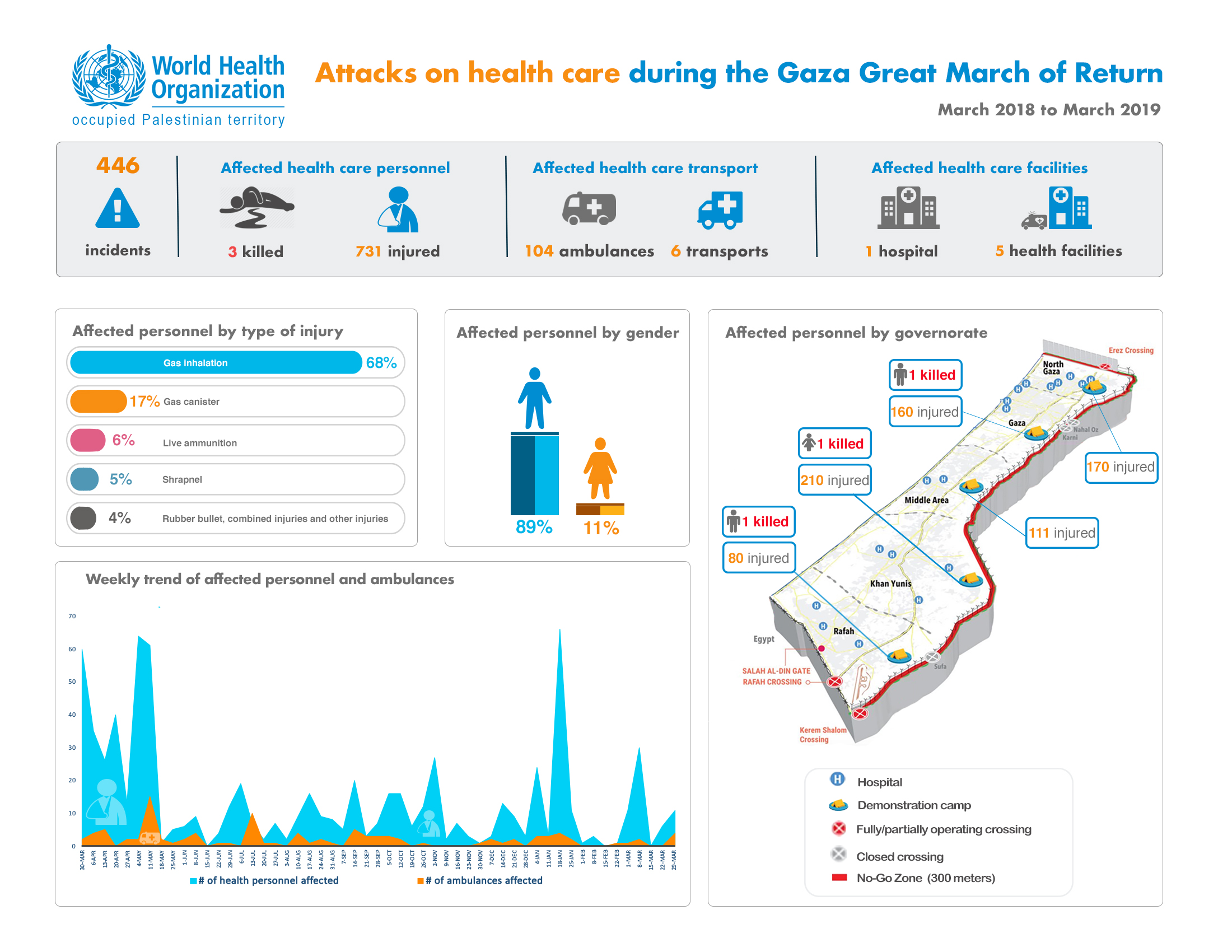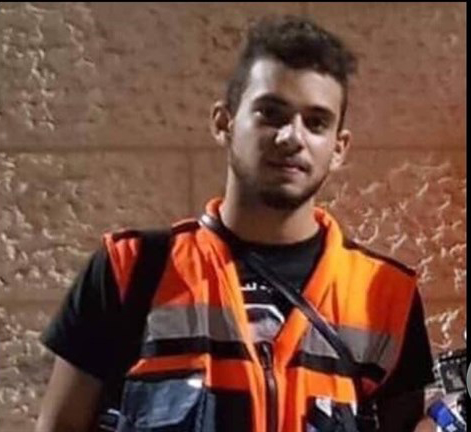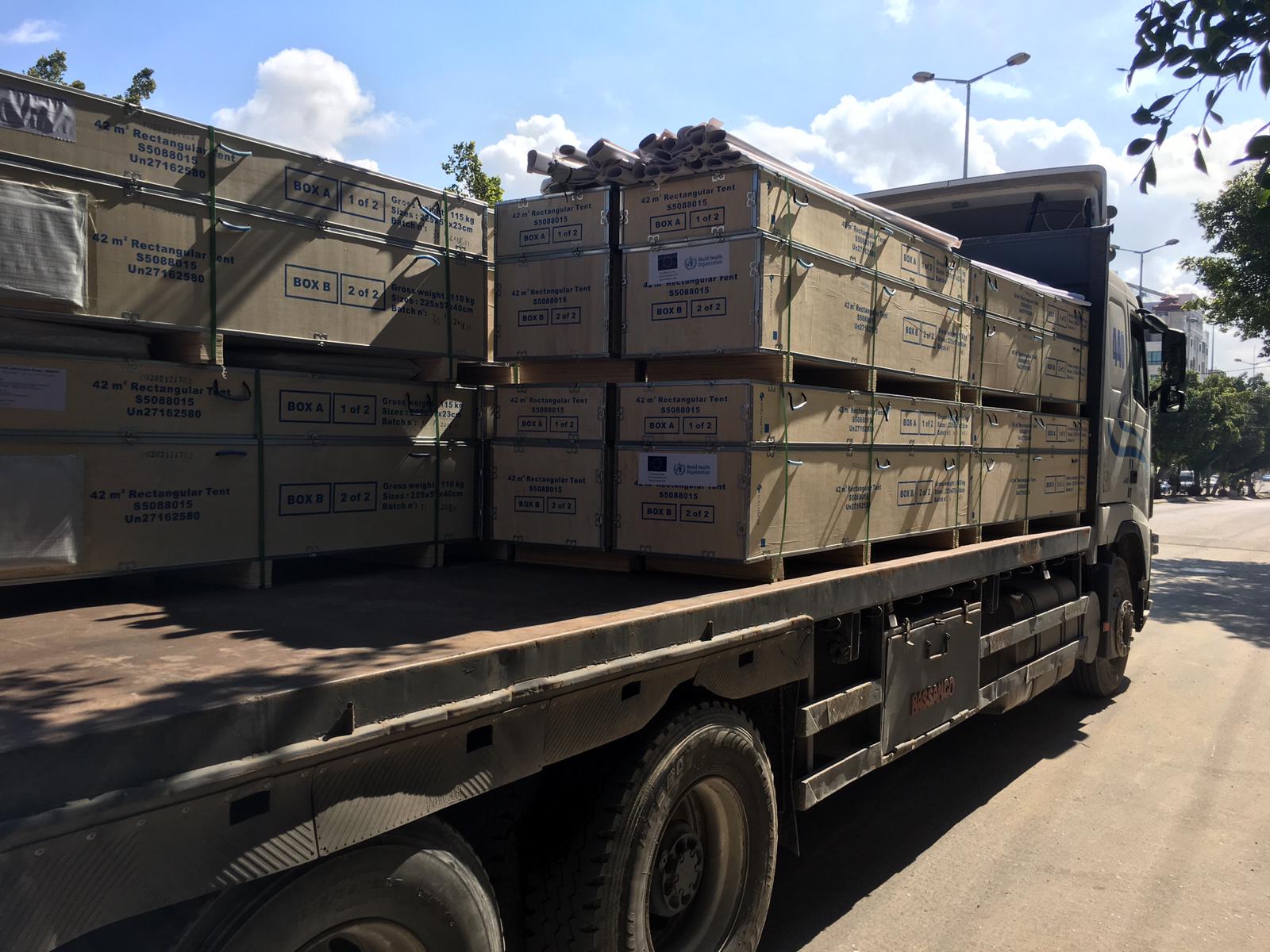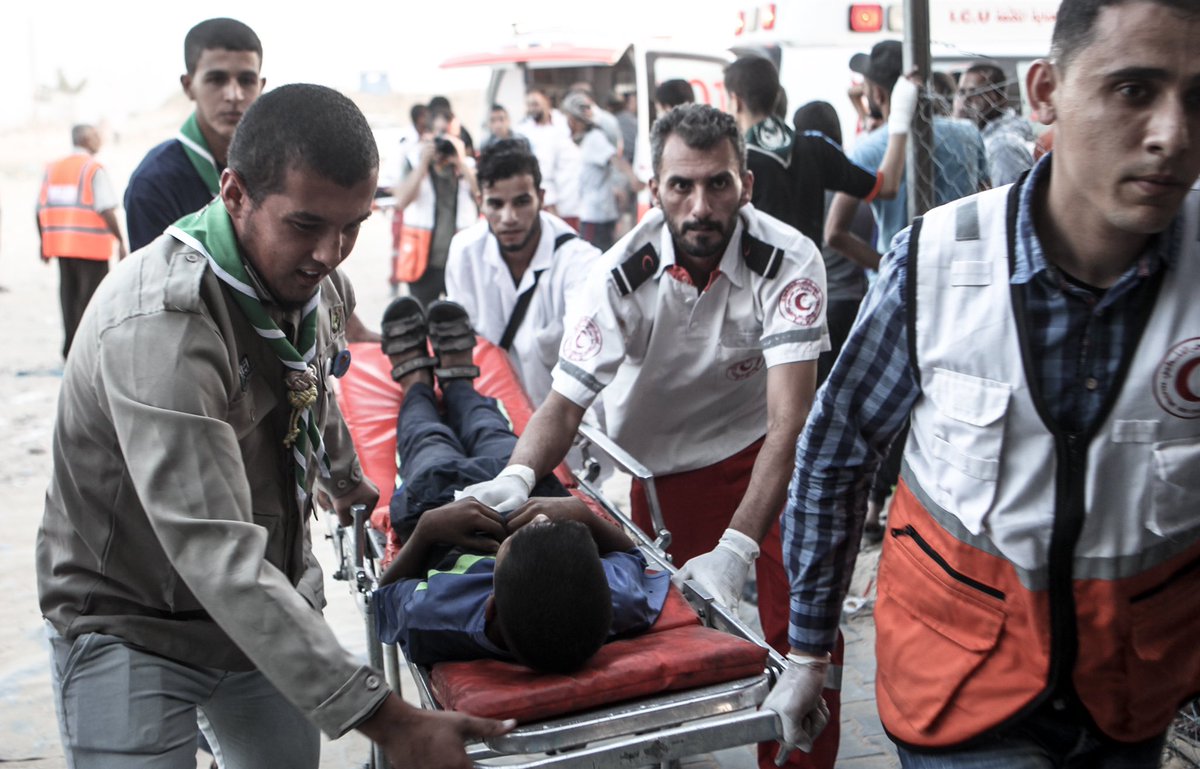Attacks on health care during the Great March of Return in Gaza
11 April, 2019 - The World Health Organization has recorded an unprecedented 446 attacks on health care in Gaza since the start of the Great March of Return on 30th March 2018. These attacks have resulted in 3 deaths and 731 injuries among health workers. 104 ambulances and 6 other forms of health transport have been damaged, in addition to 5 health facilities and 1 hospital.
Ahmed, a 25 year old volunteer first aid worker with the Palestinian Medical Relief Society (PMRS), is among those hundreds of injured health workers. He was shot in both legs while providing care during the demonstrations in early May 2018. WHO spoke with Ahmed shortly after, and he discussed the impact of his injury: “Physically I’m feeling better, but mentally I feel destroyed. It’s hard to believe that I was shot. As paramedics and volunteers helping the injured we should be protected. I was wearing a vest that clearly showed I am a health worker. I was shot providing care to someone who was suffering with teargas inhalation. Imagine.”
In addition to personal risk and damage to health care, health workers also face substantial barriers to carrying out their work: firing between health workers and those injured prevents or hampers access and witnessing such events has significant implications for longer term mental health and continued work.
WHO reiterates its call for the protection of health workers and health facilities. Health care is #NotATarget.

Download infographic: Attacks on health care during the Gaza Great March of Return
WHO strongly condemns killing of health worker in the West Bank, March 2019
 Sajed Mazher. Photo credit: Palestinian Medical Relief Society The World Health Organization (WHO) strongly condemns the killing of Sajed Mazher, a first responder working with the Palestinian Medical Relief Society in the West Bank, occupied Palestinian territory.
Sajed Mazher. Photo credit: Palestinian Medical Relief Society The World Health Organization (WHO) strongly condemns the killing of Sajed Mazher, a first responder working with the Palestinian Medical Relief Society in the West Bank, occupied Palestinian territory.
On 27 March 2019, Sajed Mezher, an 17-year* old health worker, was shot while providing care to people injured during clashes in Dheisha refugee camp in Bethlehem. Sajed was injured in his abdomen and succumbed to his injuries after he was taken to hospital.
“We are saddened by this tragic loss. Health workers provide critical care and save lives. Their protection must be ensured,” said Dr Gerald Rockenschaub, head of WHO office for the West Bank and Gaza. “Our thoughts and deepest condolences are with Sajed’s family and our colleagues at the Palestinian Medical Relief Society.”
WHO reiterates that the protection of health workers, patients and health facilities must be respected at all times. Health care is not a target.
*correction to the initially reported age of 18
WHO delivers medical supplies to scale up pre-hospital trauma care in Gaza
 WHO delivers medical supplies to scale up trauma care in Gaza24 March 2019 – The World Health Organization (WHO) delivered essential medicines, medical consumables and equipment to respond to the growing trauma and emergency care needs in the Gaza Strip. The shipment was possible through a generous contribution from the European Union.
WHO delivers medical supplies to scale up trauma care in Gaza24 March 2019 – The World Health Organization (WHO) delivered essential medicines, medical consumables and equipment to respond to the growing trauma and emergency care needs in the Gaza Strip. The shipment was possible through a generous contribution from the European Union.
Supplies delivered by WHO will be used to enhance the ability of the 10 trauma stabilization points (TSPs), run by the Ministry of Health and the Palestine Red Crescent Society, to provide life- and limb-saving care to those injured during demonstrations and protests. Interventions provided at the TSPs are of vital importance as trauma casualty rates remain high and the resources available in Gaza are scarce. In response, WHO works to strengthen all levels of trauma management and to ensure that at the pre-hospital level, the TSP teams have vital medicines and equipment for triage and initial treatment of the injured.
The shipment is sufficient to cover needs of about 120 000 mildly injured or 20 000 severely injured patients. In addition to medicines and medical supplies, WHO delivered 4 tents for each TSP to make sure the teams have adequate space to treat patients with different levels of trauma severity. Five TSPs were equipped with generators to run basic services, such as oxygen provision for patients. WHO will also provide the TSP teams with inflatable tents that can be set up within minutes in case of emergency and provide the flexibility to be moved quickly to alternative locations to treat people in need.
“Resource gaps in trauma care may lead to preventable long-term disability or even worse health outcomes. WHO and humanitarian health partners are working together to ensure that TSPs have the capacity to stabilize patients, to decrease the risk of preventable trauma complications or the loss of limbs, and to ensure better health outcomes,” says Dr Gerald Rockenschaub, head of WHO’s office for the occupied Palestinian territory. “We are grateful to the European Union for their continuous support that helps us to support essential trauma services in the Gaza Strip.”
Currently, the majority of all trauma patients are passing through the trauma stabilization points, where almost half of them are being treated and discharged while others receive the necessary care to stabilize them for the referral to the hospital for further interventions.
In addition to the massive existing trauma needs, the upcoming one-year anniversary of the Great March of Return may result in more casualties. WHO and health cluster partners developed a contingency plan to address the health needs within the 96-hours of a potential escalation of the situation in Gaza and to prevent death and disability. To further boost all levels of trauma care, WHO recently appealed for US$ 5.3 million.
WHO appeals for US$ 5.3 million to respond to trauma and emergency care needs in Gaza
 An injured patient arrives at the trauma stabilization point in Gaza. Credit:WHO18 March 2019, Gaza, oPt - The World Health Organization (WHO) is appealing for US$ 5.3 million to provide life- and limb-saving interventions to massive numbers of injured patients overwhelming an already fragile health system in Gaza. The upcoming one-year anniversary of the Great March of Return on 30 March could result in further casualties and an increase in people requiring trauma care and rehabilitation services.
An injured patient arrives at the trauma stabilization point in Gaza. Credit:WHO18 March 2019, Gaza, oPt - The World Health Organization (WHO) is appealing for US$ 5.3 million to provide life- and limb-saving interventions to massive numbers of injured patients overwhelming an already fragile health system in Gaza. The upcoming one-year anniversary of the Great March of Return on 30 March could result in further casualties and an increase in people requiring trauma care and rehabilitation services.
Funding is urgently required to ensure the minimum resources are available to immediate health needs, as well as enhance the quality of trauma and emergency care in the Gaza Strip and reduce mortality and morbidity among an at-risk population of 2 million people.
“The sheer magnitude of trauma needs in Gaza is immense. Every week injured patients continue to arrive at hospitals requiring complex long-term treatment. The requested financial support will help not just to address critical service gaps but ensure that we can work with our partners to scale up treatment capacities to provide immediate lifesaving care for emergency cases and to strengthen rehabilitation,” says Dr Gerald Rockenschaub, head of WHO’s office for the occupied Palestinian territory.
Since the start of the demonstrations in March 2018, over 29,000 people have been injured, with more than 6,500 suffering from gunshot wounds requiring long-term specialised surgical treatment and rehabilitation, for which the Gaza Strip faces persistent capacity gaps.
The massive burden of trauma casualties also affects the provision of other essential services, directly impacting capacities to provide neonatal and maternal care services and to manage chronic disease patients. Elective surgeries have to be postponed and suspended, hospital beds are reallocated and reserved for surgical patients, health staff and ambulances have to prioritize the immediate emergency needs.
In 2018, WHO supported the Ministry of Health and the Palestine Red Crescent Society to upgrade the trauma stabilisation points (TSPs) in proximity to the fence with Israel, so that the wounded can receive life-saving treatment close to the point of injury. The scope of interventions provided on-site at the TSPs has continuously expanded to cover triage, life- and limb-saving first aid and initial treatment and this has substantially reduced the burden on hospitals, with some 50% of the injured being treated and discharged at the TSPs.
The US$ 5.3 million will be used to build on the previous success of the WHO supported interventions and ensure better health outcomes for Palestinians through strengthened continuum of care along the pathway of trauma patients.
Donor brief: Strengthening Gaza's trauma care system








